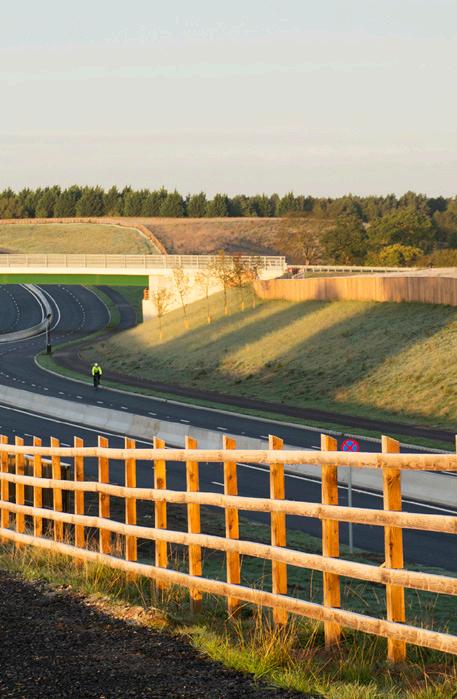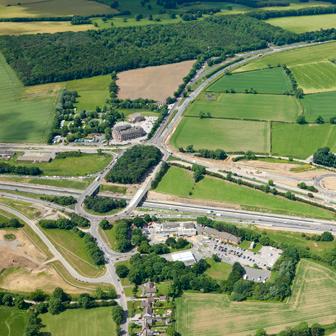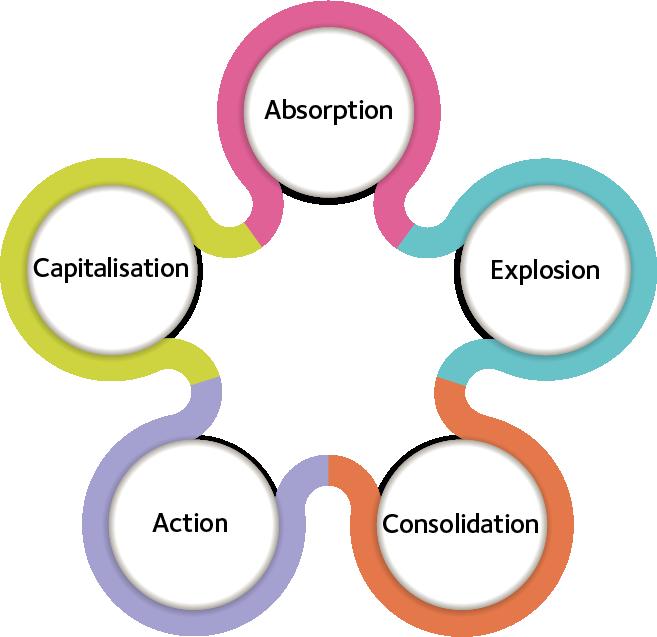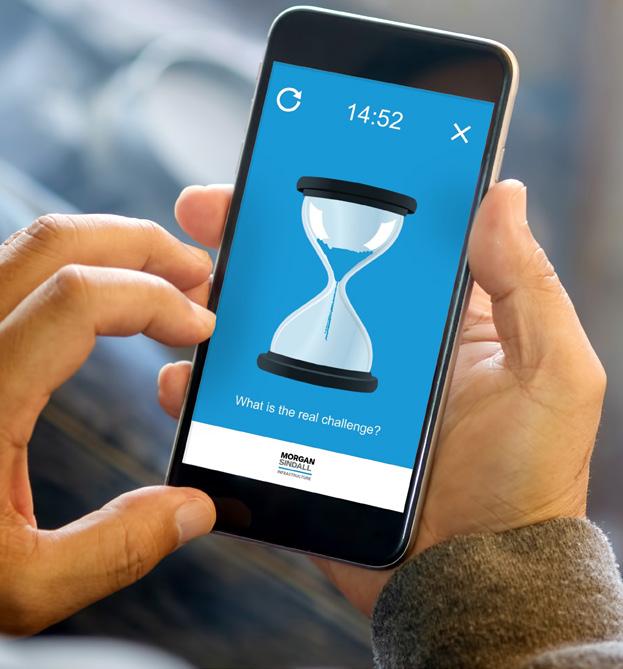
6 minute read
LAYING THE FOUNDATIONS
LAYING THE FOUNDATIONS: MAKING INNOVATION ACCESSIBLE ACROSS YOUR ORGANISATION
Tina Catling, innovation director, Morgan Sindall Infrastructure
Advertisement
We believe in challenging the status quo, and empowering colleagues to find new ways to keep each other and our communities safe each and every day. Collaborating and innovating to keep everyone safer is something that we all endeavour to do, but often the day to day gets in the way.
So how can we keep ourselves and our colleagues accountable for delivering against our ambitions to innovate? At Morgan Sindall Infrastructure, we believe that a people-first approach can pave the way. The first hurdle to overcome is to look beyond innovation simply as a process. While process is a key part of structuring the development of innovation, processes don’t create innovations; people do.
Our people-first ethos sees colleagues across various roles, levels of responsibility and skills throughout the company working with their peers to challenge the status quo. This means that innovation isn’t something that’s reserved for a specific team, working away in isolation in a separate meeting room. Instead, it’s seeded across our entire organisation, to embed innovation in all we do and make things better, faster, greener and, above all, safer.
To achieve this, it’s vital to build a culture where every colleague feels equipped with the time, tools, courage and skills to think in new and different ways. Everyone should feel that they enable innovation to thrive.

Making innovation accessible
Innovation is typically assumed to be a technical and difficult process, but it doesn’t need to be that way. The right tools and processes can make all the difference to an individual or team navigating even the most complex issues. A structure or platform to operate in can help everyone to focus on one stage at a time and reflect on how best to use their existing skills to solve the issue, while minimising the opportunity to censor ideas before they can be considered.
Our innovation process, known as the innovation flywheel, is summarised across five stages: absorption, explosion, consolidation, action and capitalisation.

Our innovation management system Echelon can then support colleagues as they work through these stages, as well as providing a platform to collaborate with and reach a wide range of colleagues both inside and outside our organisation. This enables us to benefit from the cognitive diversity needed to enrich our innovation. We need people with different skills and ways of thinking to support the development of innovations.
But these things alone aren’t enough. To be successful in innovation colleagues must know that they have the support and encouragement from their leaders, and that it is always ok to take the time and opportunity to stop and think, to collaborate, and to innovate.
Seeding innovation skills across our organisation
We know that the best way to innovate is to generate lots of ideas, and the best way to have lots of ideas is to include a lot of people and different types of thinkers. But innovation is more than an explosion of ideas; it’s about understanding the challenge, investigating the impact of potential solutions, identifying ways to make these ideas happen, and measuring their impact. These steps also need a range of different skills and ways of thinking that individuals across your business can lead and support.
We’ve coached around 10% of our colleagues in innovation best practice, known as our innovation Catalyst programme, to facilitate and support innovation on a day-to-day basis. Our innovation Catalysts are motivated, courageous and tenacious, deploying a range of workshops, thinking techniques and communication styles at different stages of the innovation process to get the best out of everyone involved. In 2020, we set out to eliminate one of the most common risks in our work environment: hand injuries. Supported by our innovation leadership group, our innovation Catalysts brought a diverse group together, working together from different points of view and ways of thinking to understand the challenge and propose novel solutions. However, innovation may only thrive in a culture where it is safe for everyone to put forward ‘off the wall’ ideas that may spark fresh new ways of thinking and working.
Building a culture of confidence and courage
In order to think freely, colleagues should have a sense of psychological safety to share ideas without judgement. Our innovation Catalysts encourage teams to respect and consider every idea, using different idea-generation exercises to suit the colleagues they’re working with and provoke fresh ways of thinking.
At our ‘explosion’ phase, we aim to come up with as many ideas as possible. Simple things such as saying ‘that’s interesting, tell me more’ rather than ‘we’ve tried that before’ creates a sense of respect that encourages colleagues to be courageous and bold with their ideas and, ultimately, delivers high-impact ideas.
Our ‘Safe Hands’ challenge delivered over 100 bright ideas, capturing a broad mix of technological, behavioural and organisational changes that could contribute to the elimination of hand injuries at work.
Focussing on communications and behavioural psychology techniques such as nudge theory, the solutions aimed to ensure individuals are maintaining personal responsibility at all times during essential ‘hands on’ tasks. Individual elements of the campaign
included specialised PPE to remind colleagues of the risks, and hand yoga to promote better hand awareness.
Meanwhile, with a focus on leveraging technology to minimise the need for ‘hands on’ activities that place hands at risk, we continue to work collaboratively with our supply chain and the wider industry.
This two-pronged approach gives us the confidence to say we’re doing all we can to eliminate the risks. But without taking the time and headspace to think about the issue, we risk a ‘sticking plaster’ approach; long-term solutions need longterm thinking.
Carving out time to think
It’s critical to support people to understand and manage the tensions between delivery of our promises today, and working on innovations to enable a better tomorrow. An affinity to efficiency and thoroughness often makes people censor themselves and their ideas, as well as creating a reluctance to take time out for free and creative thinking.
Making time to think, and empowering our teams to do the same, is a key enabler throughout our approach. Those who innovate know that it isn’t something that is done at the end of the day after completing their tasks or activities; they know that innovation is part of the work. Outside of specific innovation challenges, we encourage all our colleagues to take regular time out to think, having launched our ‘Time to Think’ app in 2020; a simple reminder to stop and think for fifteen minutes every day, ringfenced from the usual distractions.

For our ‘Safe Hands’ challenge, our innovation catalysts took time out with colleagues to gain a better understanding of the challenge, hosting workshops where colleagues were invited to draw their hands and annotate the harms they had endured over their lifetime. Moving into the ‘explosion’ phase, five separate groups were established to generate ideas with different focus areas, creating the time and space to look at the issue from several different viewpoints.
Just two of many formats that helped teams to immerse themselves in the challenge, the time that was made to truly understand the issue was instrumental in finding a solution, as well as raising awareness of the issue and engaging with colleagues across the business. This is just one example of the dozens of challenges we’re working on as an organisation this year. Whether we’re seeking out ways to eliminate single-use plastics, new technologies to accelerate projects, or new ways of working for improved wellbeing, a people-first approach to innovation can extend to each and every one.
By empowering our teams to think differently, equipping them with the time, skills, and encouragement, we can create an environment where we can really challenge the status quo, always questioning ‘is there any other way?’ where safety is concerned. As we strive for 100% safety, we believe a people-first approach to innovation provides countless opportunities to build a safe and healthy environment for us all.




